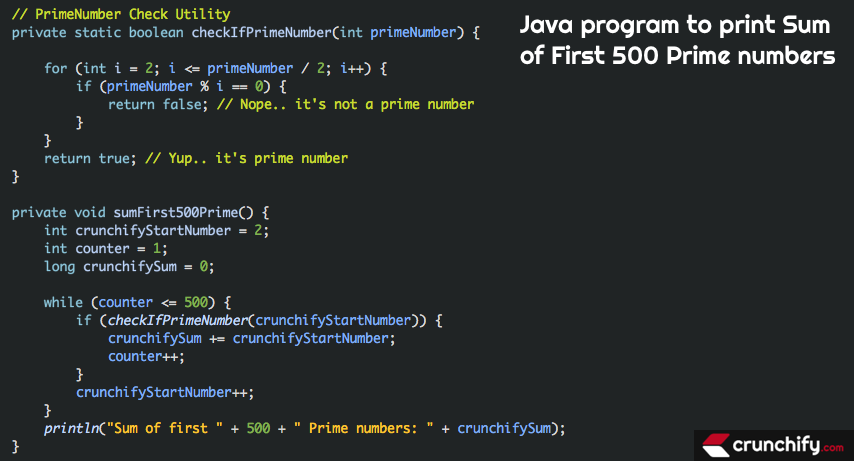
What is a Prime Number?
A number which is greater than 1 and which has no positive divisors other than 1 and itself. Sometime back I’ve written a tutorial which shows clearly if provided number is prime or not.
In this tutorial we will go over details on how to print Sum of First 500 Prime numbers. We will also provide an option for users to enter a number and Java Program will sums up provided total first Prime numbers 
Scanner class constructs a new Scanner that produces values scanned from the specified input stream.
Let’s get started:
- Create Java class
CrunchifySumOfNPrimeNumbers.java sumFirst500Prime()method will print sum of first 500 Prime numbers- Next we will ask user to enter number and program will sums up total that many numbers
checkIfPrimeNumber()is a method to find out if number is prime or not?
Here is a complete Java program to print sum of first 500 prime numbers.
package crunchify.com.tutorial;
import java.util.Scanner;
/**
* @author Crunchify.com
* Program: Java program to print Sum of First 500 Prime numbers (or First N Prime numbers)
* Version: 1.0.1
*
*/
public class CrunchifySumOfNPrimeNumbers {
public static void main(String args[]) {
CrunchifySumOfNPrimeNumbers object = new CrunchifySumOfNPrimeNumbers();
object.sumFirst500Prime();
@SuppressWarnings("resource")
Scanner reader = new Scanner(System.in); // Reading from System.in
System.out.println("\nEnter a number: ");
int myNumber = reader.nextInt();
int crunchifyStartNumber = 2;
int counter = 1;
int crunchifySum = 0;
while (counter <= myNumber) {
if (checkIfPrimeNumber(crunchifyStartNumber)) {
crunchifySum += crunchifyStartNumber;
counter++;
}
crunchifyStartNumber++;
}
println("Sum of first " + myNumber + " Prime numbers: " + crunchifySum);
}
private void sumFirst500Prime() {
int crunchifyStartNumber = 2;
int counter = 1;
long crunchifySum = 0;
while (counter <= 500) {
if (checkIfPrimeNumber(crunchifyStartNumber)) {
crunchifySum += crunchifyStartNumber;
counter++;
}
crunchifyStartNumber++;
}
println("Sum of first " + 500 + " Prime numbers: " + crunchifySum);
}
// Simple Println Utility
private static void println(String crunchifySum) {
System.out.println(crunchifySum);
}
// PrimeNumber Check Utility
private static boolean checkIfPrimeNumber(int primeNumber) {
for (int i = 2; i <= primeNumber / 2; i++) {
if (primeNumber % i == 0) {
return false; // Nope.. it's not a prime number
}
}
return true; // Yup.. it's prime number
}
}
Run the program in Eclipse IDE and you will be able find similar result:
Sum of first 500 Prime numbers: 824693 Enter a number: 800 Sum of first 800 Prime numbers: 2277959
Why is the number 1 not a prime number?
As per a Prime number definition, Prime number is a number which is always greater than 1. Number 3 and 5 are prime numbers as both numbers divided by itself and 1.
What is Composite Number?
A whole number that can be divided evenly by numbers other than 1 or itself is called Composite Number.
The post In Java How to print Sum of First 500 Prime numbers (or First N Prime numbers) appeared first on Crunchify.
0 Commentaires